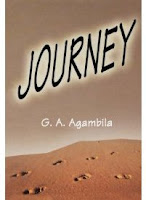198. Journey by G. A. Agambila
Journey (Sub-Saharan Publishers, 2006; 304) by G.A. Agambila is a novel about life and the uncertainties and mystery surrounding it. It is also about swimming against the cold currents of penury and traditions whilst showing the developmental gap between the Northern and Southern part of the country, Ghana. This developmental gap is no fiction and the story of the North-South migration is a common one for most folks. The motif of the story could easily have been autobiographical as most students who completed their secondary education had to either come down south (to the University of Ghana located at Accra or University of Cape Coast located at Cape Coast) or stop over at Kumasi (at the Kwame Nkrumah University of Science and Technology), in the middle part of the country, if they wanted to further their education to the university level. It still is the case even though the northern sector now has a university. There is also, in this story, of teenage trysts and frivolity.
Amoah has completed his A'Level exams and is contemplating on what to do. He is about leaving his close friends at his school before he journeys home to visit his sick grandfather and then come down south to live with his uncle who was living in a self-imposed exile away from the demands of a tradition he no longer believes or shares in. But Amoah embarks on some dangerous and teenage escapades before visiting Tinga and then on to Accra. The story is set between Amoah's last two days of his stay in school and before the GCE A'Level results were released. It is indeed a journey as decisions of the future have to be taken.
The story promises much by its title but delivered less. The author spends too much time and space narrating the events that took place in the last two days after the main character wrote his last examination. This took more than half of the novel and makes the reading tasking with the reader expecting something monumental to happen, which never did. Another issue is that the author chose to use the first person narrative style combined with the present tense for a story set in the past. For a full-length novel, these three combinations made reading extremely difficult. Had it been a short-story, the reader would not feel the drudgery and the effort that would have been required would definitely have been less. They didn't work, for me, that is; meaning that I needed a very extraordinary effort to go through complete the read. Finally, there were places where the author became philosophical. Though these were the best moments of the read, they also sounded a bit like a text-book advice; again, to me.
Regardless, one cannot discount the other qualities of Agambila's work; that it is a work that could easily be taken for an autobiography, the realities of many a Ghanaian. Again, many a teenager will identify themselves with Amoah, especially his tricks with and wishes for the ladies. It is a good read and I recommend it to those who will not be put off by the issues I have already raised.
_______________
About the author: Read about the author here.




I am not sure I am going to add this to my to read list, I am bit skeptical about it.
ReplyDeleteAfter your review, I do not think this would be a voracious read. Anyway, thanks for your most sincere review.
ReplyDelete